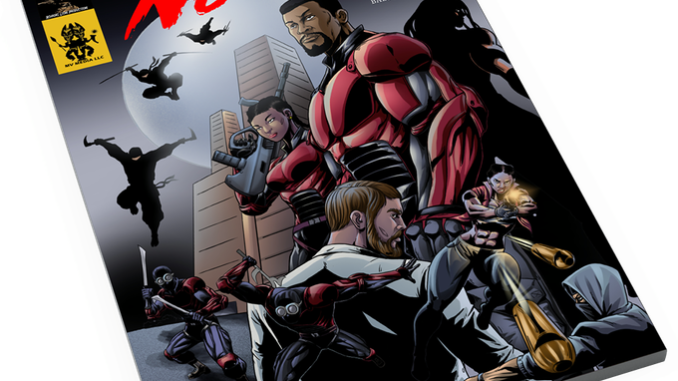
Balogun Ojetade and Milton Davis of Ki Khanga: The Sword and Soul Role Playing Game are kickstarting a trilogy of RPG products and a new comic book series. I’ve discussed conventions and Ki Khanga with Milton, so when they launched the Ngolo Diaspora crowdfunding, I knew I wanted to speak to Balogun about this project, why their developing three RPG products, and how we can be more inclusive at the gaming table.
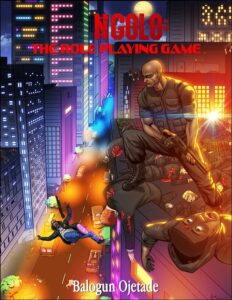 EGG EMBRY (EGG): Thanks for taking the time to talk with me. You’re a part of a two-fer comic/RPG Kickstarter campaign, the first issue of a comic mini-series as well as three tabletop roleplaying games. What is Ngolo Diaspora?
EGG EMBRY (EGG): Thanks for taking the time to talk with me. You’re a part of a two-fer comic/RPG Kickstarter campaign, the first issue of a comic mini-series as well as three tabletop roleplaying games. What is Ngolo Diaspora?
BALOGUN OJETADE (BALOGUN): Ngolo Diaspora is the first arc of a comic book series based on an award-winning screenplay by Milton Davis and I. It tells the story of a new future alternate world where assassinations are legal through sanctioned guilds and part of the political process. One guild, The Bloodmen, has become so powerful that the mention of their name brings rivals to the negotiation table. But there are powerful people who have had enough of the guilds and are determined to bring them down. Their first target? The Bloodmen!
EGG: Ngolo Diaspora is a screenplay, and, with this campaign, it will become a comic mini-series, novella, and a tabletop roleplaying game. Why did this story inspire so many types of media from you and Milton Davis?
BALOGUN: The world is so rich, so deep AND broad that it was impossible to contain in its screenplay box. Every time Milton and I discussed the screenplay and what we were going to do with it, the idea of a great comic book series kept coming to mind. At the same time, we knew that as authors, we would one day develop the screenplay into a novella. And as a player, GM and creator of roleplaying games for forty years, I consider turning any good and fun story I am a part of into a roleplaying game so I—and fans of the stories—can make and play characters within the world.
We plan to create an Ngolo series for streaming, too, but that is a bit further down the line.
EGG: This campaign offers three RPGs. Since you’re taking point on them, would you mind breaking down each of these options?
BALOGUN: The three games are Ngolo: The Role Playing Game, Ngolo: Vendetta and Ngolo: Lockdown. Ngolo: The Role Playing Game is based on Wushu: The Ancient Art of Roleplaying, a Creative Commons game by Daniel Bayn, which uses a pool of six-sided dice. Ngolo: Vendetta uses an original mechanic that incorporates Uno cards. It is fast, simple, and innovative, and I decided to use Uno cards because the game of Uno is so popular in the Black community and I wanted to make the game familiar to those of us who would love to play roleplaying games, but are confused—or intimidated—by polyhedral dice and complicated systems and tables. Finally, Ngolo: Lockdown includes two card games with roleplaying game elements—one is a player versus player game in which you both play rival guilds of assassins; the other is a solitaire game in which the player’s character is an assassin in the Bloodmen’s guild and he or she must fight their way through hordes of ninja and avoid obstacles in order to get to their mark and complete their mission.
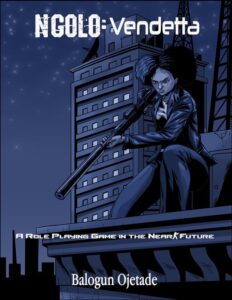
EGG: Ngolo: Lockdown RPG Style Card Games is an RPG card game. How will that work?
BALOGUN: As described above, Ngolo: Lockdown uses regular playing cards. We say RPG-style card games because as you play, it feels like a combative encounter in a roleplaying game more than a regular game of poker, Spades, or Pitty Pat. In the PvP game, you play a team of four characters—the Hitter, Fixer, Face, and the Shadow. Each character has their own abilities. Also, two six-sided dice (2d6) are used for resolution. In the solitaire game, the RPG element is purely the atmosphere and feel. Both games in Ngolo: Lockdown use a single 52-card deck of standard playing cards.
EGG: This is a world of hyper violence. How many characters will players go through in this game?
BALOGUN: If players really work together as a team, their characters just might make it to a ripe old age. If they try to be lone wolves, they’d better have another character made and ready to go. The action in Ngolo: The Role Playing Game is cinematic, over the top and deadly, so players have to be strategic and their characters have to be resourceful, but characters are rewarded for daring and for doing cool stunts, so they shouldn’t be overly cautious.
EGG: Will these games be available in print or PDF through the campaign?
BALOGUN: The games will first be available through PDF to supporters of the Ngolo Kickstarter. After the campaign, we will make print versions if the demand is strong enough.
EGG: The story comes from you and Milton Davis, the comic will be drawn by Peter Chizoba Daniel, you’re point on the RPGs, is it just you writing on the RPGs? Is Peter handling all of the art?
BALOGUN: Yes, I am writing the games based on the world Milton and I developed, based on the original story Milton created. Peter is masterfully handling all of the artwork.
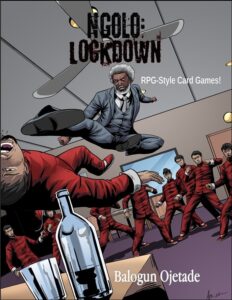 EGG: With Milton, you co-created Ki Khanga: The Sword and Soul Role-Playing Game. Let’s talk about this game for a minute. What’s the pitch for it?
EGG: With Milton, you co-created Ki Khanga: The Sword and Soul Role-Playing Game. Let’s talk about this game for a minute. What’s the pitch for it?
BALOGUN: Ki Khanga: The Sword and Soul Role Playing Game allows the player to create a character of their liking and adventure in a world of mystery and magic; of villainy and victory; of sword… and soul. Set in an analog of ancient Africa, characters are from one of the sixteen countries in the continent of Ki Khanga, a continent populated by humans, giants, dwarves, and by creatures given life by the raw anger of the Creator, found in the precious mineral kipande, which are actually shards of the Creator’s broken axe.
EGG: Ki Khanga is available for two systems, correct? Which two, and why were they they the right options for this game?
BALOGUN: The original system uses regular playing cards. We wanted a mechanic that was different from most dice-based roleplaying games that are out their and, once again, using a random generator more familiar to Black people, thus standard playing cards. The other version of Ki Khanga uses the OpenQuest system, which is a d100 system. We used OpenQuest because I love the d100 system, it is very robust and easy to learn, so while it is still easy for new Black gamers to learn and develop a love for roleplaying games, which is a great hobby, it is also appealing to veteran gamers from all walks of life.
EGG: Let me shift gears and talk a bit about the state of America. With the murders of Rayshard Brooks and Ahmaud Arbery in our state, and the murders of George Floyd, Breonna Taylor, and so many more in the wider United States, there’s a need to discuss how we can do more to get along and respect one another. Since we’re talking about RPGs, let’s look at inclusion at the gaming table. To that end, what can white gamers do to be more inclusive of Black creators and Black gamers?
BALOGUN: Know your audience. I have been told by a veteran gamer that he fears more Black people playing roleplaying games because we might “ghetto-ize” the community and gaming. I pointed out to him that his favorite RPG—Cyberpunk 2020—was created by a Black man. He turned up his nose and said, “You and he are different.” I gave him some choice words then said, “Not so different, after all, huh?” That is the last time we spoke, but I have many stories like that and have been told many. Stories of Black players in a campaign in which three out of five players owned slaves and every time they captured, beat, or raped one of their slaves, they’d slyly look over at the Black player. This kind of ignorance has to stop. There is no excusing it and those who have issue with it aren’t ruining your fun. Our enslavement wasn’t fun, funny, or just something you get over. We still suffer from the pain, turmoil, and destruction wrought by slavery. So the only thing that white gamers can do is to be thoughtful; to be mindful of people other than yourself. If you can’t do that, you are immature, selfish and proof that white privilege is, indeed, a thing.
EGG: That’s a powerful story and statement. Thank you for sharing your experiences and offering a deeper look at how racism manifests at the gaming table.
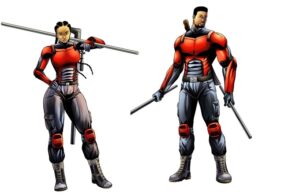
Not to minimize that topic, but I want to touch on a few more questions about you and gaming. You have another passion that informed this project. What type of martial arts do you practice, and what drew you into it?
BALOGUN: I practice indigenous African martial arts, specifically Ijakadi from Nigeria, kilijawaaro from Mali, and Laamb from Senegal. I began studying and training in indigenous African martial arts in 1972 under the tutelage of my father, who learned while living in Senegal and traveling to different parts of Africa to study the martial traditions. So, for me, training was something I had to do. I grew to love it and now work to continue my father’s legacy, including the martial arts of Africa and the Diaspora in nearly everything I write.
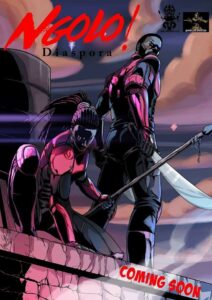 EGG: Beyond Ngolo Diaspora, what are you working on?
EGG: Beyond Ngolo Diaspora, what are you working on?
BALOGUN: I am working on the Ice Cold Carter roleplaying game, which I will put out next. I am producing two versions of it also—one using my Uno card-based system used in Ngolo: Vendetta, which I have further developed, and one that uses a pool of six-sided dice. Ice Cold Carter is a wacky character in an even wackier world, so I’m having a lot of fun working on it. I plan to spend the next year or so working on roleplaying games and creating more content for Ngolo.
EGG: Thanks for talking with me. Where can fans follow your work?
BALOGUN: You can follow me on Facebook and on Instagram at @balogun_ojetade.
Ngolo Diaspora from MVmedia, LLC
End Date: Wed, July 15 2020 7:00 AM EDT.
“An African Martial arts comic book series [and RPGs] based on the award-winning Ngolo screenplay.”
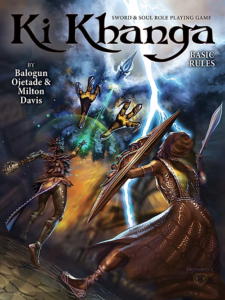 For fans interested in trying out Balogun and Milton’s Ki Khanga, check out the books and PDFs on MVmedia’s site:
For fans interested in trying out Balogun and Milton’s Ki Khanga, check out the books and PDFs on MVmedia’s site:
- Ki Khanga Sword and Soul Role Playing Game: Basic Rules
- Ki Khanga Sword and Soul Role Playing Game: Basic Rules PDF
- Ki Khanga: The Anthology
- Ki Khanga The Anthology EPUB
- Ki Khanga Poster
- Ki Khanga Combo (includes the Ki Khanga RPG Basic Rule Book, the Ki Khanga Map, and the Ki Khanga Poster)
Egg Embry participates in the OneBookShelf Affiliate Program and is an Amazon Associate. These programs provide advertising fees by linking to DriveThruRPG and Amazon.
Latest posts by Egg Embry (see all)
- New Gamemaster Month 2023 - January 20, 2023
